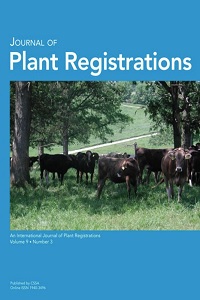Registration of ‘Verdín’, an Early-Season, Opaque Black-Seeded Bean Cultivar
In the tropical lowlands of Mexico, terminal drought is the most limiting abiotic factor for bean production in the residual moisture system. In 2014, the breeding line SEN 70 was registered by INIFAP as ‘Verdín’ common bean (Phaseolus vulgaris L.) (Reg. No. CV‐320, PI 681655). Verdín is an early‐season black bean cultivar developed through pedigree combined with mass selection for five cycles at different environments of Colombia and extensively tested under field conditions in Veracruz and Chiapas, Mexico. Verdín is well adapted to tropical areas of southeastern Mexico and exhibits tolerance to terminal drought and Bean golden yellow mosaic virus and resistance to Bean common mosaic virus. The average yield of Verdín over 12 environments in Veracruz and Chiapas was 1437 kg ha−1, 9.9 and 7.4% higher than checks cultivars ‘Negro Comapa‘ and ‘Negro Papaloapan’. In the winter–spring (February–May) dry season, Verdín was included in an irrigated versus nonirrigated field trial and was outstanding in adaptation to terminal drought (drought susceptibility index = 0.8) with high relative efficiency (relative efficiency index = 1.45). Verdín was included in a uniform yield trial conducted under residual moisture for 2 yr (2013–2014) across six environments in Veracruz and Chiapas, terminal drought occurring in four of those. In environments with terminal drought, Verdín yield was 1122 kg ha−1, 49.9 and 41.7% higher than checks ‘Negro Tacaná’ and ‘Negro Jamapa’, respectively. Without moisture stress, Verdín's yield was 1568 kg ha−1, 17.4 and 39.9% higher than the checks. Verdín can be grown under rainfed and residual moisture conditions in tropical lowlands of southern Mexico.

